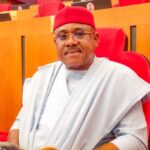Afolabi Gambari
Only Nigerians with a very poor sense of recall would have forgotten what went on in the days following President Bola Tinubu’s swearing-in on May 29, 2023. For if the majority of the people had expected to be romanticised, they got the shock of their lives when the new helmsman announced the wholesale immediate removal of the subsidy they had enjoyed on petrol in the preceding years. He simply let it be known that it would not be business as usual, though he said it in perhaps the most brutal and unsparing manner. The consequence was also immediate as it sent costs of goods and services hitting the roof, threw many into confusion and others into desperation of all sorts.
No matter that the president was forced to do a quick review of the biting hardship that accompanied the subsidy removal with the introduction of a series of palliatives, the psychological, social and mental damage had already taken full effect on the populace. Interestingly, at every turn, the government would describe such unprecedented deprivation as the sacrifice that Nigerians of today needed to make to guarantee a better future for the country. The rhetoric was a hard sell. But the government continued to pursue the course nonetheless, as poverty among the people also continued to spread. Perhaps, the worst affected were the 37 per cent of Nigerians who cast their lot for Tinubu in the belief that he would be different from the previous leaders who had put them to the sword, literally. But they simply looked on bemused as a litre of petrol jumped from N195 to N617 naira. Only to watch on soon after as the new administration floated the naira, making it depreciate from N420 per dollar official rate to almost N2,000 per dollar before being scaled down to N1,600 per dollar, but only after the government expended about $8 billion to stabilise it. The effect was too telling on some foreign companies like GlaxoSmithKline (GSK), P&G, Unilever and PZ Cussons, which closed shop within a very short period as if choreographed. Despite government’s assertion that it had rebased inflation to 24 per cent, prices of goods and services remained at the roof tops, forcing the Manufacturing Association of Nigeria (MAN) to categorically state that 50 per cent of manufacturing companies had folded up with the prospects for more collapsing in no distant future as basic amenities continued to elude the ordinary Nigerians.
By August 2023, life and living had so deteriorated that for the first time in Nigeria’s history, underage children joined street protests against hunger, leading to several of them being arrested and arraigned in court before local and international outcry forced the government to set them free. The treatment meted out to the kids while in detention underscored the fact that the people still counted less, ironically in a government that prided itself as an exponent of a renewed hope for the country.
As the government announced last month that the insecurity in the north-east was nearing its terminal point, Borno State Governor, Babagana Zulum, launched a warning this month that the insurgents were far from being decimated, even warning that some politicians and military personnel had offered themselves as informants to the insurgents. Close to 500 people have been massacred in Plateau and Benue states within the past five months without the perpetrators being brought to book. But although no emergency rule was declared in both states to stop the killings, the federal government declared a state of emergency in Rivers State in what was an exaggerated insecurity situation that has ended up injuring democracy rather than mending it.
Kidnappings that have persisted in the south-east, south-west and south-south are not about to abate, despite pledges of mitigation from the government.
The government presented the Economic and Financial Crimes Commission (EFCC) to Nigerians as a dragon, purporting to have re-engineered the anti-graft agency under a new leadership. But so far, all the successes achieved by the agency are more anticipatory than concrete, as its leadership seems more interested in sermonising on how the country is milked by corrupt people than actually reining in the corrupt individuals. The agency itself has spent more time engaging in image cleansing than moving against economic saboteurs.
The NNPC Limited is not off the radar as well. After ceremoniously announcing late last year that the Warri and Port Harcourt refineries had been refurbished and resumed operations, it announced again last week that operations had been suspended at the Port Harcourt refinery for maintenance, whose completion date was not set, representing a setback in the reform of the petroleum sector. That all this is happening at a time when there should be accountability of how the billions of naira that had been budgeted for the refinery maintenance in the recent past yielded no dividend certainly calls for serious scrutiny.
So much promise was offered by the power sector at the advent of the Tinubu administration. But the sector has so far delivered so little and, in fact, has been responsible for malnourished productivity that the country has suffered in the last two years. To be fair, the somewhat ceaseless collapse of the national grid last year has abated considerably. But still, it serves very little promise, no thanks to the Presidency’s latest plan to spend N10 billion to provide independent solar power supply to Aso Villa.
Despite having an over-bloated cabinet of 48 substantive ministers and senior special advisers, the largest in Nigeria’s history, it has not resulted in concrete progress for the administration. To this day, it is not known what purpose the Central Results Delivery and Coordination Unit the government established in June 2023, headed by Hadiza Bala-Usman and tasked with officially evaluating ministerial performance, does in actuality. At any rate, the coordinator cannot be more positioned than the ordinary Nigerians in assessing how the administration has fared. Whether it is the finance ministry or defence or health or education or housing or agriculture or blue economy or aviation or foreign affairs or women’s affairs or sports, the successes recorded are the same – anticipatory for the most part. However, the interior ministry represents an edge with some promise, thanks to the tireless efforts by the minister, Olubunmi Tunji-Ojo, leading to passport processing becoming far more efficient and much less cumbersome. At the same time, immigration officials have been trained in the modern ways of exercising their functions. Tunji-Ojo would, however, still need to focus more on fixing the rot at the country’s correctional centres to make them truly correctional for inmates.
With the campaign for re-election in 2027 already taking shape, despite INEC not having officially flagged it off, and a gale of endorsements for Tinubu sweeping across the country, it is unlikely that the administration would deviate from its governance course at the detriment of the people. It remains to be seen how the next six months in particular will evolve.







